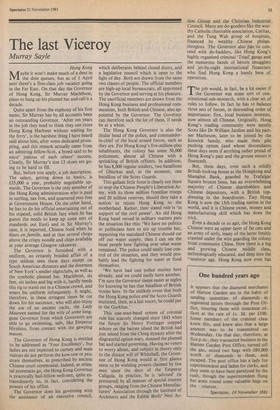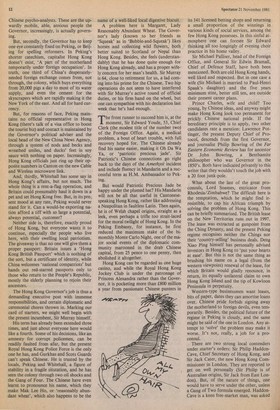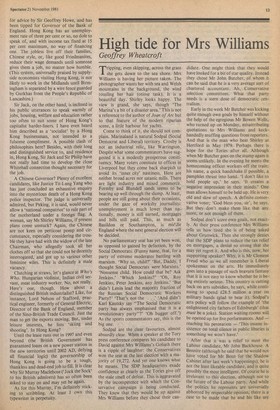The last Viceroy
Murray Sayle
Hong Kong Maybe it won't make much of a dent in the dole queues, but as of I April next there's a first-class job vacancy going in the Far East. On that day the Governor of Hong Kong, Sir Murray Maclehose, plans to hang up his plumed hat and call it a decade.
Quite apart from the euphony of his first name, Sir Murray has by all accounts been an outstanding Governor. 'After ten years in the job they tend to think they can cross Hong Kong Harbour without waiting for the ferry', is the harshest thing I have heard said about him, after some dedicated prompting, and this remark actually came from an admiring fellow-Scot, a breed said to be unco' jealous of each others' success. Clearly, Sir Murray's size 13 shoes are going to be hard to fill.
But, before you apply, a job description.
The salary, getting down to basics, is 05,000 a year, probably negotiable upwards. The Governor is the only member of the Hong Kong administration who is paid in sterling, tax-free, and quartered rent-free at Government House. On the other hand, he has to do his official entertaining out of his stipend, solid British fare when he has guests (he needs to keep up some sort of standards out East) and in Sir Murray's case, it is reported, Chinese food when he dines en famille, and at that several chops above the crispy noodle and chips available at your average Glasgow takeaway.
The Governor is furnished with a uniform, an ornately braided affair of a type seldom seen these days except on South American dictators and the doormen of New York's seedier nightclubs, as well as the symbolic plumed hat. Maclehose, six feet, six inches and big with it, hardly needs this rig to stand out in a Chinese crowd, and wears his uniform infrequently. It might, therefore, in these stringent times be cut down for his successor, who will also enjoy the use of an ancient yacht, the Lady Maureen named for the wife of some longgone Governor from which Governors are able to go swimming, safe, like Emperor Hirohito, from contact with the gawping masses.
The Governor of Hong Kong is entitled to be addressed as 'Your Excellency', but ladies are not expected to curtsey and male visitors do not perform the kow-tow or prostrate themselves, as prescribed by ancient Chinese court ceremonial. Indeed, as oriental potentates go, the Hong Kong Governor is practically hail-fellow-well-met, quite extraordinarily so, in fact, considering the powers of his office.
The Governor does his governing with the assistance of an executive council, which deliberates behind closed doors, and a legislative council which is open to the light of day. Both are drawn from the same two classes of people. The official members are high-up local bureaucrats, all appointed by the Governor and serving at his pleasure.
The unofficial members are drawn from the Hong Kong business and professional com munities, both British and Chinese, also appointed by the Governor. The Governor can therefore sack the lot of them, if needs be at a whim.
The Hong Kong Governor is also the titular head of the police, and commander in-chief of the local armed forces, such as they are. For Hong Kong's five-million-plus inhabitants, the colony has some 30,000 policemen, almost all Chinese with a sprinkling of British officers. In addition, he has 8,000 regular soldiers, two batallions of Ghurkas and, at the moment, one batallion of the Scots Guards.
This gallant little force is clearly not there to stop the Chinese People's Liberation Ar my, with its three million frontline troops and 20 million reserves, should they take a notion to rejoin Hong Kong to the motherland. Rather, their stated role is 'in support of the civil power'. An old Hong Kong hand versed in military matters puts the situation like this: 'We have no politics or politicians here to stir up trouble but, supposing the mainland Chinese should cut off our water supply, then I can see the local people here fighting over what water remained. The police could easily lose con trol of the situation, and they would probably lead the fighting for water or food themselves.
'We have had one police mutiny here already, and we could easily have another. I'm sure the Governor sleeps easier at nights for knowing he has that batallion of British troops here. In the unlikely event that both the Hong Kong police and the Scots Guards mutinied, then, as a last resort, he could put in the Gurkhas.'
This one-man-band system of colonial rule has scarcely changed since 1843 when the future Sir Henry Pottinger stepped ashore on the barren island the British had just seized from the Ching dynasty after the disgraceful opium wars, donned the plumed hat and started governing. Having no voters to worry about, and subject in theory only to the distant will of Whitehall, the Governor of Hong Kong would at first glance seem to be wielding powers claimed by few men since the days of the Emperor Caligula. In practice, he is 'advised' (ie pressured) by all manner of special interest groups, ranging from the Chinese Manufacturers' Association through the Institute of Architects and the Edible Birds' Nest Ac tion Group and the Christian Industrial Council. Many are do-gooders like the worthy Catholic charitable association, Caritas, and the Tung Wah group of hospitals, financed by wealthy Chinese philanthropists. The Governor also has to contend with do-badders, like Hong Kong's highly organised criminal 'Triad' gangs and the numerous bands of heroin smugglers and jet-by-night international financiers who find Hong Kong a handy base of operation.
The job would, in fact, be a lot easier if the Governor was some sort of constitutional sub-monarch, with a clear set of rules to follow. In fact he has to balance three sets of forces, in descending order of importance: first, local business interests, now almost all Chinese. Originally, Hong Kong's trading community were mostly Scots like Dr William Jardine and his partner Matheson, later to be joined by the Keswick family, who made their pile pushing opium (and whose descendants these days seem if anything rather proud of Hong Kong's past and the grouse moors it financed).
But, these days, even such a solidly British-looking house as the Hongkong and Shanghai Bank, guarded by Trafalgar Square bronze lions, has an overwhelming majority of Chinese shareholders and Chinese depositors, with a British topdressing in the boardroom. Tiny Hong Kong is now the 13th trading nation in the world, and it is Chinese sweat, money and manufacturing skill which has done the trick.
Even a decade or so ago, the Hong Kong Chinese were an upper layer of fat cats and an army of serfs, many of the latter freshly crawled under the wire guarding the colony from communist China. Now there is a big and growing Chinese middle class, technologically educated, and deep into the transistor age. Hong Kong now even has Chinese psycho-analysts. These are the upwardly mobile, able, anxious people the Governor, increasingly, is actually governing.
But, secondly, the Governor has to keep one eye constantly fixed on Peking, or Beijing for spelling reformers. In Peking's shorter catechism, capitalist Hong Kong doesn't exist, 'A part of the motherland temporarily under foreign occupation'. In truth, one third of China's desperatelyneeded foreign exchange comes from, not through, the colony, which buys everything from 20,000 pigs a day to most of its water supply, and even the cement for the skyscrapers which are rapidly making it the New York of the east. And all for hard currency.
But, for reasons of face, Peking maintains no official representative in Hong Kong (there's talk of a visa office to boost the tourist biz) and contact is maintained by the Governor's political adviser and the local head of the New China News Agency, through a system of nods and becks and wreathed smiles, and ducks' feet in soy sauce with nothing on paper. Increasingly, Hong Kong officials just ring up their opposite numbers in Canton on the new Cable and Wireless microwave link.
And, thirdly, Whitehall has some say in Hong Kong's affairs, but not much. The whole thing is a rent-a-flag operation, and Britain could presumably haul it down in a pet and set Hong Kong free. But, in its present mood at any rate, Peking would never stand for it. Can a would-be exporting nation afford a tiff with so large a potential, always potential, customer?
Neither side is, therefore, exactly proud of Hong Kong, but everyone wants it to continue, especially the people who live here, with their swelling local patriotism. The giveaway is that no one will give them a proper passport: Britain issues a 'Hong Kong British Passport' which is nothing of the sort, but a certificate of identity, while China welcomes 'national compatriots' but hands out red-starred passports only to those who return to the People's Republic, mostly the elderly planning to rejoin their ancestors.
The Hong Kong Governor's job is thus a demanding executive post with immense responsibilities, and certain diplomatic and ceremonial chores thrown in. Marking our card of starters, we might well begin with the present incumbent, Sir Murray himself.
His term has already been extended three times, and just about everyone here would like a fourth. Some of his decisions, like an amnesty for corrupt policemen, can be readily faulted from afar, but the present Royal Hong Kong Police Force is the only one he has, and Gurkhas and Scots Guards can't speak Chinese. He is trusted by the locals, Peking and Whitehall, a figure of stability in a fragile situtation, and he has seen the colony through two oil shocks and the Gang of Four. The Chinese have even learnt to pronounce his name, which they make Mak Lee Ho, or 'reasonably abundant wheat', which also happens to be the name of a well-liked local digestive biscuit.
A problem here is Margaret, Lady Reasonably Abundant Wheat. The Governor's lady (known to her friends as 'Squeak' as in 'Bubble-and-Squeak') likes horses and collecting wild flowers, both better suited to Scotland or Nepal than Hong Kong. Besides, she feels (understandably) that he has done quite enough for Hong Kong already, and has a proper wifely concern for her man's health. Sir Murray is 64, close to retirement for us, a lad coming into his prime for the Chinese. Two hip operations do not seem to have interfered with Sir Murray's active round of official duties, or his firm hand on the wheel, but one can sympathise with his declaration last week that he's had enough.
The front runner to succeed him is, at the moment, Sir Edward Youde, 53, Chief Clerk (the modest title of the number two) of the Foreign Office. Again, a medical problem, a bout of heart trouble, with full recovery hoped for. The Chinese already find his name easier, making it Oh Da Wa Ya, or 'patriotic precious jade'. Sir Patriotic's Chinese connections go right back to the days of the Amethyst incident and include fluency in Mandarin and a successful term as H.M. Ambassador to Peking.
But would Patriotic Precious Jade be happy under the plumed hat? His Mandarin will not be all that useful in Cantonesespeaking Hong Kong, rather like addressing a Neapolitan in faultless Latin. Then again, he is of Welsh chapel origins, straight as a leek, even perhaps a trifle too strait-laced for the moral twilight of Hong Kong. In the Peking Embassy, for instance, he first reduced the maximum stake of the bimonthly Monte Carlo Night, one of the major social events of the diplomatic community marooned in the drab Chinese capital, from 25 pence to one penny, then abolished it altogether.
Hong Kong can be regarded as one huge casino, and while the Royal Hong Kong Jockey Club is under the patronage of Princess Alexandra rather than the Governor, it is pocketing more than £800 million a year from passionate Chinese punters in its 141 licensed betting shops and returning a small proportion of the winnings in various kinds of social services, among the few Hong Kong possesses. In this sinful atmosphere one can foresee Sir Edward thinking all too longingly of evening choir practice in his home valley.
Sir Michael Palliser, head of the Foreign Office, and General Sir Edwin Bramall, Chief of Defence Staff, have both been mentioned. Both are old Hong Kong hands, well liked and respected. But in one case a wife (Sir Michael is married to Paul-Henri Spaak's daughter) and the five years minimum stint, better still ten, are outside their present career plans.
Prince Charles, wife and child? Too young, by Chinese ideas, and anyway might make Hong Kong look too permanent for prickly Chinese national pride. If the hereditary principle is to apply, two other candidates rate a mention: Lawrence Pottinger, the present Deputy Chief of Protocol, descends from the first Governor, and journalist Philip Bowring of the Far Eastern Economic Review has for ancestor Dr John Bowring, a Benthamite philosopher who was Governor in the 1850's. Both have indicated privately to this writer that they wouldn't touch the job with a 20 foot junk-pole.
What about the last of the great proconsuls, Lord Soames, extricator from Rhodesia/Zimbabwe? The difficult here is the temptation, which he might find irresistible, to cap his African triumph by solving the problem of Hong Kong. This can be briefly summarised. The British lease on the New Territories runs out in 1997. The lease was extracted at gunpoint from the Ching Dynasty, and the present Peking regime recognises neither the Chings nor their 'country-selling' business deals. Deng Xiao Ping himself has personally advised investors in Hong Kong to 'put your hearts at ease'. But this is not the same thing as brushing his name on a legal (from the western viewpoint) renewal of the lease, for which Britain would gladly renounce, in return, its equally unilateral claim to own Hong Kong Island and the tip of Kowloon Peninsula in perpetuity.
Western-type businessmen want leases, bits of paper, dates they can amortise loans over. Chinese pride forbids signing away the motherland to foreign devils, even temporarily. Besides, the political future of the regime in Peking is cloudy, and the same might be said of the one in London. Any attempt to 'solve' the problem may make it worse. It's not, really, a job for a proconsul.
There are two strong local contenders under starter's orders: Sir Philip HaddonCave, Chief Secretary of Hong Kong, and Sir Jack Cater, the new Hong Kong Commissioner in London. They are reported to get on well personally (Sir Philip is of Australian origins, Sir Jack from East London). But, of the nature of things, one would have to serve under the other, unless a Gang of Two formula emerged. HaddonCave is a keen free-market man, was asked for advice by Sir Geoffrey Howe, and has been tipped for Governor of the Bank of England. Hong Kong has an unemployment rate of three per cent or so, no dole to speak of, and with income tax fixed at 15 per cent maximum, no way of financing one. The jobless live off their families, Chinese style, or, like good Friedmanites, reduce their wage demands until someone gives them a job, no matter how humble. (This system, universally praised by supplyside economists visiting Hong Kong, is not likely to work in the Midlands until Birmingham is separated by a wire fence guarded by Gurkhas from the People's Republic of Lancashire.) Sir Jack, on the other hand, is inclined in his public utterances to speak warmly of jobs, housing, welfare and education rather too often to suit some of Hong Kong's capitalist harder-liners. I have even heard him described as a 'socialist' by a Hong Kong businessman, not intended as a fulsome compliment. A possible clash of philosophies here? Besides, with their long and distinguished service to, and residence in, Hong Kong, Sir Jack and Sir Philip have not really had time to develop the close Whitehall connection thought necessary for the job.
A Chinese Governor? Plenty of excellent candidates, like Justice Tit-Lung Yang who has just concluded an exhaustive enquiry into the mysterious death of a Hong Kong police inspector. The judge is universally admired, but Peking, it is said, would never allow a 'national compatriot' to rule part of the motherland under a foreign flag. A woman, say Ms Shirley Williams, if present plans come unstuck? Again, the Chinese are not keen on petticoat pomp and circumstance, especially considering the trouble they have had with the widow of the late Chairman, who allegedly took all her clothes off so that she could not be decently interrogated, and got up to various other feminine wiles. This is definitely a male vacancy. Clutching at straws, let's glance at Who's Who. Hungarian violinist, Indian civil servant, meat industry worker. No, not really. Here's one, though. How about a distinguished British industrialist? Like, for instance, Lord Nelson of Stafford, practical engineer, formerly of General Electric, Director of the Bank of England, member of the Sino-British Trade Council. Just the man to _get the exports moving. But, under leisure interests, he lists 'skiing and shooting'. In Hong Kong? Until the lease runs out in 1997 and even beyond (the British Government. has guaranteed loans on a new power station in the new territories until 2002 AD, defying all financial logic) the governorship of Hong Kong is going to be a tough, thankless and dead-end job to fill. It is clear why Sir Murray Maclehose (`Jock the Sock' to his British admirers) has so often been asked to stay on and may yet be again. As for this Murray, I'm definitely sticking to scribbling. At least I own this typewriter in perpetuity.












































 Previous page
Previous page